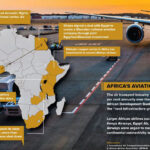BIRD STORY AGENCY
WELL aware of the growth trajectory in Africa, more international air cargo airlines are entering and expanding their operations across the continent.
“It is one of the fastest-growing aviation markets for both air cargo and passenger confidence,” said Hassan El-Houry, the chairperson of Menzies Aviation Group, explaining why in just the past year, there has been a surge in international cargo airlines rolling out operations in the African market.
El-Houry, whose multinational air cargo company operates across Africa, explained that Africa is also an attractive investment space because the sector “will be accelerated by the African Continental Free Trade Area.”
That’s a narrative that may yet have to enter into regular business engagements on the continent, but air cargo operators are clearly preparing for a new era of growth.
Chapman Freeborn, the global air charter specialist, recently became the latest company to announce expansion plans in Africa.
The charter expert, which has concentrated its operations in South Africa’s air cargo markets, will expand its coverage this year to the whole of sub-Saharan Africa.
The UK-based air charter and leasing group announced that it tripled the size of its African team after recording a 30% year-on-year rise in cargo revenues, between 2021 and 2023.
Sharon Vaz-Arab, Chapman Freeborn’s regional CEO, attributes the expansion to Africa’s infrastructural developments.
“Infrastructure in Africa is developing quickly to support international trade, and we see major advancements on the logistics and supply chain front,” she said.
“We have an extremely talented team in Africa, and my estimate is that if Chapman Freeborn’s Africa operations continue at this pace, we will need a much larger office by the year end,” she said during the 21st – 23rd February Air Cargo Africa summit in Johannesburg.
A number of air freighting multinationals new to the continent are also making debuts in the African market.
GM Asia Cargo Network, a reputable Indonesian air cargo company, disclosed its intent to open an air cargo cooperation using a joint venture system with Green Flag Aviation Co. Ltd, a Sudanese aviation Company and earlier in February, South Africa also welcomed Suid Cargo, a new cargo airline that will begin operating its non-scheduled flights from OR Tambo International Airport in the second quarter of 2023.
Suid Cargo will start by leasing a Boeing 727-200F from Kenya’s Astral Aviation Ltd and charter flights on Astral’s Boeing 747-400F, Boeing 767, and Boeing 757F.
A January 2023 IATA report shows that Africa contributes only 1.9% to the global cargo market – showing up a huge opportunity for operators who get their timing right.
Notwithstanding its small contribution to the global cargo market, internationally, air freighting is showing solid signs of recovery and economic success.
Boeing’s World Air Cargo Forecast 2022-2041, suggests the sector will boom in the next 20 years.
“Air cargo trade between Africa and Europe will grow 3.2% per year, while Africa–East Asia air cargo trade will expand at an average annual growth rate of 5.4%,” read the report.
Africa-Asia will be majorly driven by imports to be dominated by China. European economic growth, on the other hand, will be propagated by bi-directional trade between Africa and Europe.
African economic diversification into manufactured products and continued moderate growth in African perishables are expected to be the main drivers of air cargo exports to Europe.
“The aviation industry will soar as a result of the greater geopolitical stability, harmonized aviation standards, lower air tariffs and greater passenger confidence,” El-Houry noted.
Among other reasons, the sector’s relatively slow growth historically has been due to many African airlines using the traditional freight model of selling space for cargo on commercial flights.
This, however, is changing, with different African airlines rolling out dedicated cargo flights and expanding their cargo fleets to increase capacity and calm demand.
RwandAir in November 2022 delivered its first dedicated cargo aircraft, a Boeing 737-800 SF, while Ethiopian Airlines leased three additional Boeing aeroplanes designed to carry cargo, towards the end of 2022. The airline’s cargo division also launched a new freighter service connecting China and Brazil.
Kenya Airways, which in 2021 converted a Boeing 787 into a cargo ‘preighter’, also has more expansion-focused plans.
Dick Murianki, cargo director at Kenya Airways, told the Air Cargo Africa event in Johannesburg that the carrier wanted to add two B373-800Fs, to its cargo fleet.
However, industry players believe more needs to be done to unleash the sector’s full potential and attract investments.
Frank Van Gelder, Secretary General of Pharma.aero, an international cross-industry collaboration platform for LifeScience and MedTech shippers explains that infrastructural gaps would limit rapid growth of his sub-sector, in the near term.
“There are very few high-level equipment needed for pharmaceutical logistics available only in very few airports,” he explained in an interview on Stat Trade Times, an air cargo and logistics news site.
As he notes, such limitations affect the logistics sector in isolation and pose spillover effects on the continent’s development.
“Some of the big pharma companies are looking into developing production areas in Africa. But on the other hand, the logistics are not yet on the level it should be,” he stated.
El-Houry, on the other hand, believes that these will change because “there is political will to connect Africa first to connect African countries with one another through the single African air transport market, then with the rest of the world.”














